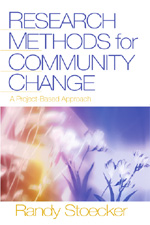
|
|
Book Review
Research Methods for Community Change: A Project-Based Approach
 Written by Randy Stoecker
Written by Randy Stoecker Sage Publications, Inc. Thousand Oaks, CA, USA London, UK © 2005 076192888X/ 0761928898 Research Methods for Community Change is a practical and thoughtful guide for all who have a burning desire to actualize fairness, justice, peace and true democracy. Written in a narrative style that includes personal anecdotes and observations, stories from Alice in Wonderland, common idioms and jokes that in no way diminish vital scholastic insight, this book is accessible to both community workers and students. Stoecker provides a summarized list of conclusions and concrete investigative resources in addition to the expected endnotes and takes the reader chapter by chapter through research methods that are systematic and goal-oriented. Throughout the book Stoecker confronts the truth of how community work stretches and challenges your will as you encounter the realities of issues such as possible homelessness due to predatory lending practices, child abuse, domestic violence, and job loss as well as the navigation of community-based organization, office, city, state, and local politics. Stoecker has written this for people who want to get their hands dirty and resuscitate unhealthy communities. In the first chapter, Stoecker argues that ongoing systematic goal-oriented research can yield better results. Community-based organizations and their staff who produce real, concrete, and measurable project-specified results demonstrate the importance of their work to funders and have an advantage in obtaining and maintaining funding. Chapter two examines the roles and capacities of the researcher, and explores the differences between the work of academic researchers and community-based researchers. In chapter three, Stoecker presents the project-based approach to research methods, and addresses the long-standing lack of connection that academic research methods have had with actualizing community change. To emphasize that the goal-oriented nature of project-based research is to resuscitate unhealthy communities, Stoecker uses medical terminology in the titles of chapters four through seven: diagnosing the problem, prescribing an intervention, implementing the prescription, and evaluating the impact. In chapter seven, Stoecker discusses evaluation. While evaluation is the end of the research process, it is best seen as an ongoing process, one that should include community members. Stoecker shares his evaluations with the community so they can participate in their own portrayal before he delivers reports to funders or government officials, and he shows that community change brought about democratically in this way is as important as creating the change itself. In the last chapter, Stoecker discusses research methods as a lifestyle, and begins by discussing how his parents were able to educate themselves about getting affordable prescription drugs. Such techniques as popular education involve learning information based on real, immediate needs and Stoecker shows how integrating research into our lives can lead to our becoming more of a do-it-yourself society rather than one in which we pay others to do research as service for us. When you work in a community you find that the community is quite knowledgeable about what its problems are and how to solve them. The benefit of community-based research is that the community becomes empowered. Communities can leverage their knowledge by working with organizations or academics who have chosen to recognize the power and privileges a university provides and lend them to long-time disempowered communities. As community workers and students who aspire to create change in communities, it is important to note the difference between knowing information and having the ability to influence. Recognizing and using your power and privileges to create change in communities is not paternalistic, it is a real and noble effort. In sum, read this book and use it. It is a thoughtful and practical guide that offers priceless resources for community workers and students who want to create community change.
Comments
|